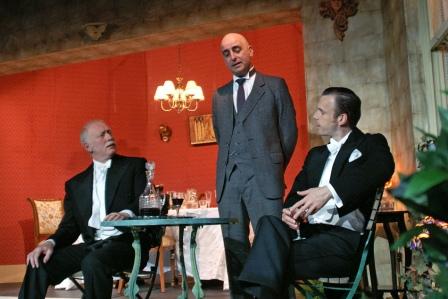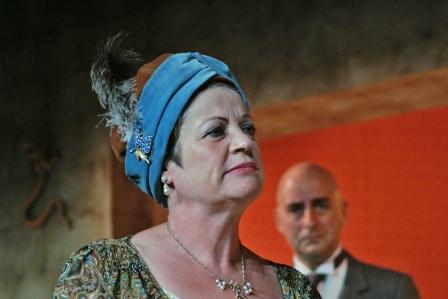|
|
|||||||||||||||||||||||||||||||||||||||||||||||||||||||||||||||||||||||||||
Click
here for more pictures of this play |
|||||||||||||||||||||||||||||||||||||||||||||||||||||||||||||||||||||||||||
|
|||||||||||||||||||||||||||||||||||||||||||||||||||||||||||||||||||||||||||
|
Click here for the
NODA crit for this play |
|||||||||||||||||||||||||||||||||||||||||||||||||||||||||||||||||||||||||||
|
An Inspector Calls was a very interesting choice of play. In our current climate, with the recession, the widening polarity between the classes and the Big Society agenda, this play, although written after the Second World War, has some very relevant messages and reflection for us today. The Thursday night’s performance was a full and diverse audience with a good mix of age. The front of house was very warm and friendly and all was set for a good night out. The play began with a still image that was striking and imposing. It was a strong beginning, beautifully lit with an arresting set; a proscenium arch within a proscenium arch. This informed the audience that they were very much an observer, a witness and as the play went on even a jury member, of this constructed unreal world. Andrew Rogers played a very convincing Arthur, the archetypal self made man. He was strong and consistent. As an actor Andrew was also able to almost simultaneously parody the character of Arthur but remain true and real. This allowed us, as the audience, to feel sympathy and at the same time laugh at him, especially his references to his social standing and possible coming knighthood. Andrew has a good sense of pace, held a strong accent throughout and, as a main character, was able to steer the play’s timing well. Wendy Butler portrayed a very a detached, toffee-nosed, haughty Sybil; a character whose social standing gives her a confidence despite incredible naivety. Wendy’s comic timing was priceless and she received some of the largest laughs. Shelia, the daughter’s character played by Roz Gerrie, has an interesting journey through the play; she starts as very prim and proper and is in fact quite artificial. It is through the ‘reality check’ of her fiancé Gerald’s revealed affair that she becomes more human / humane and begins to question her family’s beliefs. This is not an easy transition to play, but this was handled well and convincingly. There was a good mother daughter inter-play and dynamic with both thinking that that other is rather stupid. Gerald, David Stelfox, looked absolutely great; his facial expressions were guilt personified from the off. He played the contradiction of his sympathy for Daisy and his complete belief that the Birlings had done nothing wrong, very well. In fact it was these contradictions that all the characters had, that was so well observed and illuminated. Eric played by Spencer Mills gave and intense performance of a man intensely uncomfortable with himself. Spencer held an inner shame that took the audiences eye, even before his story was unfolded. The almost cinematic ‘gestic’ acting of Eric’s gnawing guilt, kept in place by alcohol, forced the audience again not to emote with the character but question this family beliefs and sensibilities. And finally the maid – played by Sophie Robertson, she was maid personified – her humble servitude and complete acceptance of her place in the world adding to the message that JB Priestly is trying to make. Goole the Inspector, played by Paul Caira is a difficult character to play, yet it is pivotal to the success of the play’s meaning. He doesn’t have the same journey as the others. His all knowingness could put him in danger of being 2D. But this was not the case, he played him incredibly naturally, he is almost the only ‘real’ character in the play. This naturalness juxtaposed the others, highlighted their awkwardness and falsity and pushed the audience to questions the family’s beliefs. He was quite chilling in his lack of sympathy and this in turn forced the audience not to be passive but question the beliefs, actions and the consequences of this middle-class family. This was a good and strong production, directed with a confidence and ease. Of course, with all productions rehearsed in a relatively short time period it has some of the obvious difficulties. People can drop lines, lose a bit of pace etc etc. Yet this play held its own and I went away having had a good evening and talked for a great while in the bar afterwards about the play, its characters, historical content and our divisions in society today. The play had made its impact. Interesting how that as the summer came to an end there were riots I wonder how many modern day Evas joined them. |
|||||||||||||||||||||||||||||||||||||||||||||||||||||||||||||||||||||||||||



